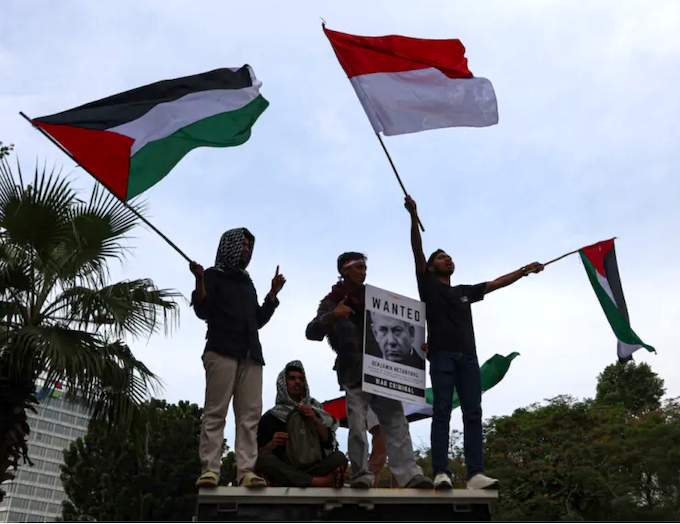
ANALYSIS: By Dr Muhammad Zulfikar Rakhmat
Indonesia is preparing one of the largest peacekeeping deployments in its history — a 20,000-strong force of soldiers, engineers, medics and logistics personnel — to enter the shattered and starving Gaza Strip.
Three brigades, three hospital ships, Hercules aircraft, a three-star general, a reconnaissance team, battalions for health services, construction and logistics — Jakarta is moving with remarkable speed and confidence.
But the moral clarity that Indonesia prides itself on in its support for Palestine is now in danger of being muddied by geopolitical calculation.
- READ MORE: Amnesty warns ‘genocide not over’ as Israel strikes across Gaza
- Indonesian Navy says 3 hospital ships ready for Gaza mission
- Other Gaza reports
And that calculation, in this case, is deeply entangled with a plan conceived and promoted by US President Donald Trump — a plan that critics argue would freeze, not resolve, the structures of domination and blockade that have long suffocated Gaza.
Indonesia must ask itself a hard question: Is it stepping into Gaza to help Palestinians — or to help enforce a fragile order designed to protect the status quo?
For years, Indonesian leaders have proudly stated that their support for Palestine is grounded not in expediency but in principle.
President Prabowo Subianto has reiterated that Jakarta stands “ready at any moment” to help end the suffering in Gaza. But readiness is not the same as reflection. And reflection is urgently needed.
Tilted towards Israel
Trump’s so-called stabilisation plan envisions an International Stabilisation Force tasked with training select Palestinian police officers and preventing weapons smuggling — a mission framed as neutral but structurally tilted toward Israel’s long-standing security demands.
The plan does little to address the root political causes of Gaza’s devastation. It does not confront Israel’s decades-long military occupation.
It does not propose a just political horizon. And it does not establish meaningful accountability for continued violations, even as reports persist that ceasefire terms are repeatedly breached.
A peacekeeping force that does not address the underlying conditions of injustice is not peacekeeping. It is de facto enforcement of a deeply unequal arrangement.
Indonesia’s deployment risks becoming just that.
Former deputy foreign minister Dino Patti Djalal has urged caution, warning that Indonesian troops could easily be drawn into clashes simply because the territory remains saturated with weaponry, competing authorities and unresolved political tensions.
He argues that Indonesia must insist on crystal-clear rules of engagement. With volatility always a possibility, a mission built on ambiguity is a mission built on quicksand.
Impossible peacekeeper position
His warning deserves attention. A peacekeeper who does not know whether they are expected to intervene, withdraw or hold ground in moments of confrontation is placed in an impossible position.
And should Indonesian forces — admired worldwide for their professionalism — be forced to navigate chaos without a political framework, Jakarta will face unpredictable political and humanitarian consequences at home and abroad.
More troubling is the lack of political strategy behind Indonesia’s enthusiasm. Prabowo’s government frames this mission as a humanitarian and stabilising operation, but it has not clarified how it fits within the long-term political resolution that Indonesia claims to champion.
For decades, Jakarta has stood consistently behind a two-state solution. Yet today, after the destruction of Gaza and the collapse of any credible peace process, many Palestinians and international observers argue that the two-state paradigm has become a diplomatic mirage — repeatedly invoked, never realised, and often used to justify inaction.
If Indonesia truly wants to stand for justice rather than merely stability, it must be willing to articulate alternatives. One of those alternatives — controversial but increasingly discussed in academic, political and human rights circles — is a rights-based one-state solution that guarantees equal citizenship and security for all who live between the river and the sea.
Such a political horizon would require courage from Jakarta. Supporting a single state would mean breaking sharply from US policy preferences and acknowledging that decades of partition proposals have failed to deliver anything resembling peace.
But Indonesia has taken courageous positions before. It has spoken against apartheid in South Africa and, most recently, called out the global community’s double standards in the treatment of Ukraine and Palestine.
Jakarta must be moral voice
If Jakarta wants to be a moral voice, it cannot outsource its vision to a proposal drafted by an American administration whose approach to the conflict was widely criticised as one-sided.
Indonesia’s soldiers are being told they are going to Gaza to help. That is noble. But noble intentions do not excuse political naivety.
Before Jakarta sends even a single battalion forward — before the hospital ships are launched, before the Hercules engines warm, before the three-star commander takes his post — Indonesia must ask whether this mission will move Palestinians closer to genuine freedom or merely enforce a temporary calm that leaves the underlying injustices untouched.
A peacekeeping force that sustains the structures of oppression is not peacekeeping at all. It is maintenance.
Indonesia can — and must — do better.
Dr Muhammad Zulfikar Rakhmat is the director of the Indonesia-MENA Desk at the Centre for Economic and Law Studies (CELIOS) in Jakarta and a research affiliate at the Middle East Institute, National University of Singapore. He spent more than a decade living and traveling across the Middle East, earning a BA in international affairs from Qatar University. He later completed his MA in International Politics and PhD in politics at the University of Manchester. This article was first published by Middle East Monitor.












































